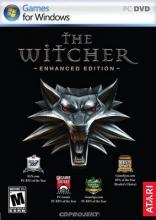The Witcher

Thanks to my roommate’s recommendation, I played the Witcher. It’s a pretty good European RPG. The game has a rich story, setting, and philosophy, which I like. It stands as a novel. It was based off of a novel.
The protagonist is Geralt of Rivia. Geralt is a witcher, a mutant that takes mutagenic chemicals to fight monsters. Once upon a time, the witchers were all that prevented the world from devolving into chaos. A generation before the game starts, there was a war, and there was massive scapegoating against nonhumans, including elves, dwarves, and witchers, so the witchers are now few in number. Now, civilization is managing (well... apart from the war and racism) without the witchers thanks to things like cities, politics, and technology, so the witchers are having trouble finding their place in the world. It’s kind of like Buffy.
There are three big antagonists in the game. The Salamandra steal Witcher mutagenic secrets at the start; the Scoiatel are a band of nonhuman terrorists fighting against persecution; the Order of the Flaming Rose is a bigoted cult. A few times, Geralt has to side with either the Scoiatel or the Order, but, usually, Geralt can condemn them all as evil.
The place of the Witchers and the conflict between the Scoiatel and the Order is where a lot of the story and philosophical development happens. The Witchers were created to create order by fighting monsters, the instruments of chaos in the world, but now evil wears a suit and tie and claims higher ideals, and some monsters are good. The Scoiatel have bad means (terrorism) but good ends (resisting persecution of nonhumans, feeding hungry kids). The Order is a little icky all around: they don’t usually initiate violence, but they do encourage bigotry, they are fine with violence against nonhumans, and their goal world doesn’t seem like a very nice place.
One thing that I don’t like about the game is that it isn’t character driven. In Planescape: Torment, the protagonist loses his memory much like Geralt, but he is surrounded by people who used to know him and who have a ton of character development. That character development develops both the protagonist and the other characters. In The Witcher, there isn’t a whole lot of character development. Geralt has amnesia, never regains his memories, and only learns a little bit about who he used to be. Geralt’s philosophy is developed (in the form of things that the player decides), but that philosophy only relates to Geralt’s interaction with the story and the world. Of the other characters, even though many exist throughout the game, most of them seem archetypal without much deviation. Some of them have interesting things happen to them, but the only ones that I feel like I care about by the end of the game are Geralt and Alvin, a kid that Geralt takes care of for a large part of the game.
There are also tons of loose ends remaining at the end. This, possibly, makes sense since there is a sequel (coming out in May, 2011) and there are some books. However, at the end of The Witcher, I didn’t feel like anything special happened. The last chapter of the game seemed to do the minimum necessary to resolve the plot threads that had been established, and those resolutions weren’t particularly elegant and didn’t lead to any new insight. In Planescape, the later parts of the game felt rushed (because they were; the game studio wanted the developers to finish by some deadline), but the final developments felt meaningful and elegant. Part of the problem with the Witcher might be that there was a plot twist at the end, but there wasn’t enough time to explore all of the questions that the twist raised.
The gameplay was pretty good. I dislike games that make you wait around (ie, in Everquest, you had to sit around a long time to regain your health and magic points), and the Witcher was pretty fast paced. The combat system was engaging because there was timing, movement, spells, and preparation. There was statistic-based development (which I have been conditioned to like) that wasn’t too limiting but still allowed developing Geralt to fit one of several combat archetypes. The game had a maximum inventory size, but it was very reasonable, so it wasn’t annoying. The game didn’t have a ton of equipment to worry about (you have two swords and a suit of armor), which was probably a good thing. A lot of games have a lot of equipment, which becomes annoying to manage and doesn’t add much. Big Massively Multiplayer Online RPGs (Everquest, World of Warcraft) use equipment as the prime differentiating factor for characters: once you hit the level cap, you still need to spend hundreds of hours to get the best equipment, and having more equipment means you can spend more time on this. A few games manage to have a bunch of equipment without making it too menial, but I support the choice to make it simple.
The one thing that I didn’t like about the gameplay is that the difficulty peaks in the second of five chapters. After then, if you specialize in fire magic, three right clicks in rapid succession can kill a dozen of the strongest monsters in the game, and 3 second later, you regenerate enough energy to cast your spells again. Combat is easy enough that it doesn’t make sense to use any of the other spells, which have unique strategic benefits, because you could already end the combat before you see the strategic benefits. And because sword combat gets more powerful the longer you have been in combat (your first hit is weak, your fifth is very strong) whereas fire magic is always strong, the only time that using a sword is faster than incinerating everything in your path is in boss fights or before you get good at fire magic.



